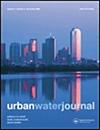一种新的配水管网管道分组和修复干预调度方法
IF 1.6
3区 环境科学与生态学
Q3 WATER RESOURCES
引用次数: 0
摘要
摘要制定有效的中长期恢复战略对于应对配水管网的持续恶化过程至关重要。开发了一种支持管道修复规划的新方法,包括使用图论建立和安排中长期干预措施,并通过实际案例研究进行了演示。该方法分为两个主要阶段:第一阶段是根据可用预算和管道连通性定义修复管道组,第二阶段是根据相关标准对这些组进行时间安排。这种方法使每年用于修复的财务金额与一组待修复的单管之间的对应关系更加清晰。结果表明,与水务公司目前采用的传统方法相比,该方法可以更好、更先进地规划干预措施。本文章由计算机程序翻译,如有差异,请以英文原文为准。
A novel methodology for pipe grouping and rehabilitation interventions scheduling in water distribution networks
ABSTRACT The establishment of effective medium and long-term rehabilitation strategies is essential to counter the continuous process of deterioration of the water distribution networks. A novel methodology to support pipe rehabilitation planning, including the establishment and scheduling of interventions in the medium and long-term using the graph theory, is developed, and demonstrated using a real case study. This methodology is divided into two main phases: the first is the definition of rehabilitation pipe groups according to the available budget and pipes connectivity and the second is the scheduling of these groups over time according to relevant criteria. This approach allows a clearer correspondence between the financial amounts to be annually invested in rehabilitation and a grouping of single pipes to be rehabilitated. Results demonstrate that the methodology allows a better and advanced planning of interventions when compared with the current traditional approaches applied by water utilities.
求助全文
通过发布文献求助,成功后即可免费获取论文全文。
去求助
来源期刊

Urban Water Journal
WATER RESOURCES-
CiteScore
4.40
自引率
11.10%
发文量
101
审稿时长
3 months
期刊介绍:
Urban Water Journal provides a forum for the research and professional communities dealing with water systems in the urban environment, directly contributing to the furtherance of sustainable development. Particular emphasis is placed on the analysis of interrelationships and interactions between the individual water systems, urban water bodies and the wider environment. The Journal encourages the adoption of an integrated approach, and system''s thinking to solve the numerous problems associated with sustainable urban water management.
Urban Water Journal focuses on the water-related infrastructure in the city: namely potable water supply, treatment and distribution; wastewater collection, treatment and management, and environmental return; storm drainage and urban flood management. Specific topics of interest include:
network design, optimisation, management, operation and rehabilitation;
novel treatment processes for water and wastewater, resource recovery, treatment plant design and optimisation as well as treatment plants as part of the integrated urban water system;
demand management and water efficiency, water recycling and source control;
stormwater management, urban flood risk quantification and management;
monitoring, utilisation and management of urban water bodies including groundwater;
water-sensitive planning and design (including analysis of interactions of the urban water cycle with city planning and green infrastructure);
resilience of the urban water system, long term scenarios to manage uncertainty, system stress testing;
data needs, smart metering and sensors, advanced data analytics for knowledge discovery, quantification and management of uncertainty, smart technologies for urban water systems;
decision-support and informatic tools;...
 求助内容:
求助内容: 应助结果提醒方式:
应助结果提醒方式:


